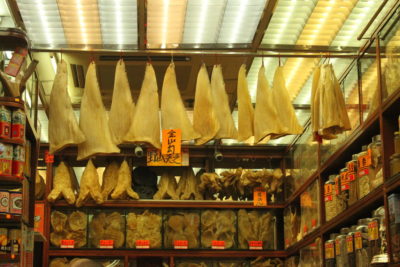


By: Bettina Wassener
HONG KONG — Few things epitomize the burgeoning affluence and consumerism of the swelling middle class in mainland China as well as the soaring sales of luxury handbags, cars, and shark fin soup. Yes, shark fin soup.
Once a delicacy confined to the upper echelons of Chinese society, the pricey soup is considered a must-serve at the lavish banquets that mark big occasions like weddings or corporate celebrations. And thanks to the galloping economic growth China has achieved since the 1990s, the soup is within the financial reach of millions of newly prosperous people.
The result has been severe overfishing. Scientists estimate that many millions of sharks are killed every year, primarily for their valuable fins.
Add to that the fact that these creatures reproduce slowly, and you get a sharp decline in global shark populations, to the extent that some scientists say about 30 percent of all shark species are in danger of extinction. And because sharks are at the top of the food chain, their declines have a profound effect on the balance of marine ecosystems.
Clearly, we have a problem. So the fact that shark fin soup is losing its appeal in Hong Kong is at least a snippet of good news.
A survey of about 1,000 Hong Kong residents, published here earlier this month and believed to be the most in-depth study of its kind to date, showed 78 percent of respondents considered it “acceptable” to leave shark fin soup off the menu at events like weddings.
That is a pretty surprising majority, considering the dish’s tremendous status-symbol appeal. Moreover, since nearly 90 percent of the soup is consumed at such set-menu affairs, this shift is an important sign that actual consumption in Hong Kong could be waning.
Commissioned by Bloom, a nongovernmental organization that aims to protect vulnerable marine species, and conducted by the University of Hong Kong, the survey found that 89 percent of respondents understood that shark populations were declining.
Although 58 percent of respondents said they had made no change to the amount of shark fin soup they had consumed over the past five years, more than a third said they had cut down.
Hong Kong is not a key player in the actual fishing of sharks. The list of top fishing nations includes Argentina, France, India, Indonesia, Spain and the United States, according to a report by the wildlife monitoring network Traffic and the Pew Environment Group, published in January.
But the city is the main hub for the world’s shark fin trade. About 9,000 tons of fins, worth hundreds of millions of dollars, are imported each year, according to government statistics. So what happens in Hong Kong matters globally.
Encouragingly, attitudes also appear to be shifting in the vastly bigger mainland market, according to Peter Knights, executive director at WildAid. For the past few years, the organization has been running anti-shark-finning campaigns on the mainland featuring Yao Ming, the Shanghai-born National Basketball Association star, among others. It also plans to run a national awareness week, in conjunction with the Chinese Fisheries Ministry, in June.
“The fact that we’re allowed to do all this campaigning, and with the aid of state media, is a clear sign that the authorities are condoning the message,” Mr. Knights said by phone from San Francisco.
“Only legislation can stop shark fin trading and reduce the killings of sharks,” Mr. Ding said, adding that the mainland, Hong Kong and Taiwan consume 95 percent the world’s fins.
The United States also has been taking steps to counter the shark trade in recent months: state legislatures in California, Oregon and Washington have introduced bills to ban possession of shark fins and trade in them, said Michael Skoletsky, executive director at Shark
In another sign that the topic is getting top-level attention, a deputy of the National People’s Congress in Beijing, Ding Liguo, filed a proposal last month to ban trade in shark fins, according to a report from Xinhua, the state-run news agency, trade in them, said Michael Skoletsky, executive director at Shark Savers in New York. But let us not get overly optimistic.
Shark fin soup remains firmly ensconced on the menus of many top restaurants in China, including those of several international hotel chains. I still regularly hear of shark-fin soup being served at official or corporate events, and of wedding couples whose desire not to serve the dish has been overruled by their relatives. Every day, my journey to work in Hong Kong takes me past shops selling thousands of dried fins.
“The fundamental problem is that too many sharks are still being killed,” said Mr. Skoletsky of Shark Savers.
Traffic and Pew, in their January report, sharply criticized the world’s top fishing nations for doing too little to protect sharks. “The fate of the world’s sharks is in the hands of the top 20 shark catchers, most of whom have failed to demonstrate what, if anything, they are doing to save these imperiled species,” the authors wrote.
The Hong Kong government, meanwhile, merely prohibits trading in three shark species protected under the Convention on International Trade in Endangered Species of Wild Fauna and Flora, or CITES, rather than the far larger number of species that scientists say are threatened.
But people in Hong Kong favor action to protect sharks. Nearly 90 percent of respondents in the Bloom survey said Hong Kong should ban the sale of products that involve killing endangered species. A similar proportion supports a prohibition of shark fin imports into Hong Kong.
Still, campaigners say they are deeply worried that change is coming too slowly.
Moreover, the shift in awareness about sharks does not necessarily extend to the many other finite resources — other animals, or materials like wood, oil and coal — that are under pressure from rising demand from industrialized economies and fast-growing countries like China.
“There needs to be a fundamental shift in our attitudes to natural resources in general,” said Yvonne Sadovy, a professor and fisheries expert at the University of Hong Kong’s School of Biological Sciences.
As for sharks, the trade in their fins is ultimately going to end, said Mr. Knights of WildAid. “The question is, will it end while we’ve still got some sharks left?”
Stay in touch and get the latest WildAid updates.
SIGN UPAbout WildAid
WildAid is a non-profit organization with a mission to protect wildlife from illegal trade and other imminent threats. While most wildlife conservation groups focus on protecting animals from poaching, WildAid primarily works to reduce global consumption of wildlife products such as elephant ivory, rhino horn and shark fin soup. With an unrivaled portfolio of celebrity ambassadors and a global network of media partners, WildAid leverages more than $308 million in annual pro-bono media support with a simple message: When the Buying Stops, the Killing Can Too.
Journalists on deadline may email communications@wildaid.org


